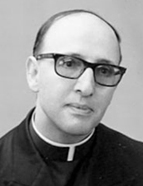

in 1979, his civic intervention work, Repensar Portugal [Rethinking Portugal] (Editora Multinova [Multinova Publishing House]); and, in 1980, his last publication in life, Occasionalia: homens e ideias de ontem e de hoje [Occasionalia: men and ideas of yesterday and today] (Multinova). All his published and unpublished writings have been compiled and brought back to light since 2005 in a critical edition of his Obras Completas [Complete Works], in seven tomes and a total of fourteen volumes, covering thematic areas (Fundação Calouste Gulbenkian). The last tome includes a biography and detailed indexes.
Rather than markedly historiographical, Manuel Antunes' work may be characterised as the consolidation of a line of thinking with a historical slant. As confirmed by Luís Reis Torgal, "though not a historian per se", Father Manuel Antunes "is of special significance in the field of teaching the history of culture, besides his very interesting reflections in the area of the history of culture" (“A história em tempo…” ["History in time..."], História da história… [History of history...], 1998, p. 295). Considering his manifold scope of action, his work is remarkable in three fields: contemporary history, history of Portuguese literature, and history of classical culture.
His constant engagement in political reflection went beyond the duties of a Jesuit, and that perspective, as expressed in the Brotéria and in his monographs, was considered by Mário Sottomayor Cardia as an essential page in the history of the reception of Marxism in Portugal. He was, at the same time, a problematiser and a witness to his contemporaneity. (Um pedagogo…, 2011, pp. 246-263).
Formally invested in 1952, he became known as a literary critic and historian in the Brotéria. Through his innovative themes and approaches, he remains a reference to this day, in particular of the Portuguese modernist and surrealist movements, of which he was one of the first and leading scholars (História crítica…, vol. 7, 409-ss; vol. 8, pp.73-ss, 311-ss; vol. 9, pp. 73-ss [Critical history…, vol. 7, 409-ff; vol. 8, pp.73-ff, 311-ff; vol. 9, pp. 73-ff]; História da literatura..., 1992, pp.1009-ss, 1957-ss [Literary History 1992, pp.1009-ff, 1957-ff). He disseminated the new Portuguese and European literature, granting a place for poetry and the literary journals of young artists. (Um pedagogo…, 2011, p.251). This interest had a methodological impact, since it also followed the path of the dialectical sociology of literature, with a vision that was very similar to that of Lucien Goldman, who considered the work not as a 'reflection' of society or an author's line of thinking, but as the mental structure of a period.
